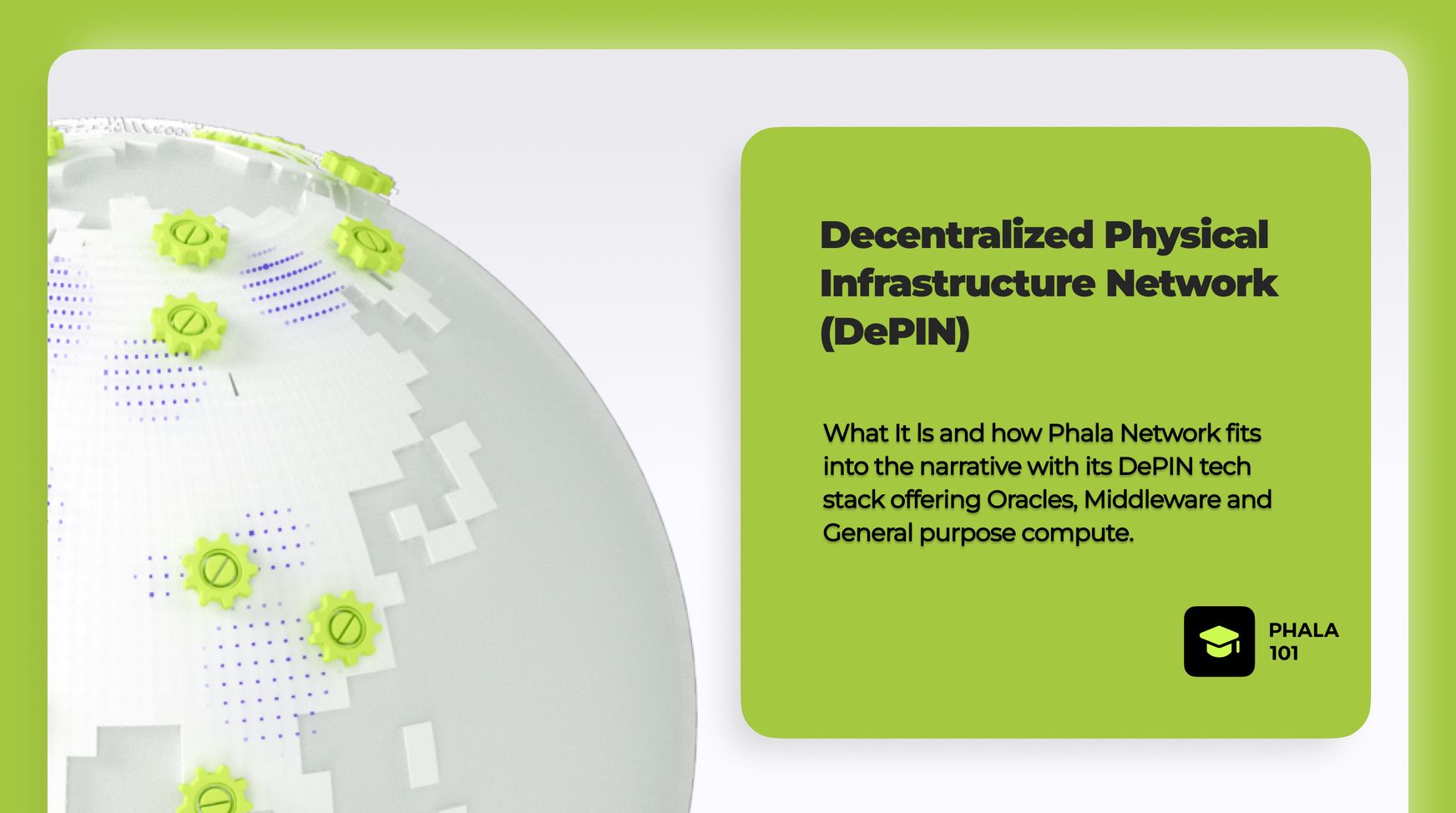
DePIN, short for Decentralized Physical Infrastructure Networks, represents revolutionary blockchain frameworks that create, sustain, and manage tangible hardware infrastructure in an open and decentralized fashion.
TL;DR
Phala Network is a crucial player in the DePIN ecosystem, providing middleware, oracle, and general-purpose compute functionalities. The DePIN Flywheel, driven by token incentives, fosters a sustainable decentralized physical infrastructure. Phala's role includes efficient communication, enhancing interoperability, and addressing data availability challenges within the DePIN framework.
The article explores Phala's middleware use cases, oracle capabilities, and general-purpose compute functionality. Furthermore, it presents an argument for DePIN as a Coprocessor in modern dApps, emphasizing the importance of achieving mass adoption through enhanced smart contracts and improved user experience.
What is DePIN?
DePIN in the context of blockchain stands as a network where crowd-sourced providers offer real-world services to users, utilizing a public ledger (blockchain) to document rendered services and receive corresponding rewards in cryptocurrencies on the same or another blockchain network.
Within DePINs, the blockchain serves as a multifunctional tool – an administrative hub ensuring a permissionless system for both providers and users, a remittance mechanism enabling users to access services via blockchain solutions, and a record-keeping facility documenting every transaction on the ledger, often accessible to the public.
The versatility of DePINs extends across various sectors, encompassing crowd-sourced geographical services and sophisticated infrastructural marketplaces, all operating seamlessly on the blockchain.
DePINs are classified into two broad categories;
As per Messari's analysis, DePINs can be categorized into two distinct groups, based on the underlying hardware, available resources, and the range of goods and services offered by the network.
- Physical Resource Networks (PRNs): PRNs are location-based, decentralized networks involving providers contributing hardware resources such as connectivity, mobility, and energy. These services are specific to a location, making them non-fungible and sometimes non-portable.
- Digital Resource Networks (DRNs): DRNs comprise fungible digital resource providers contributing computing power, shared bandwidth, or storage. Unlike PRNs, these resources are not tied to a specific location or locational data.
Phala Network operates in the DRN space, specializing in coprocessing and providing services like middleware, oracle, and general-purpose computing.
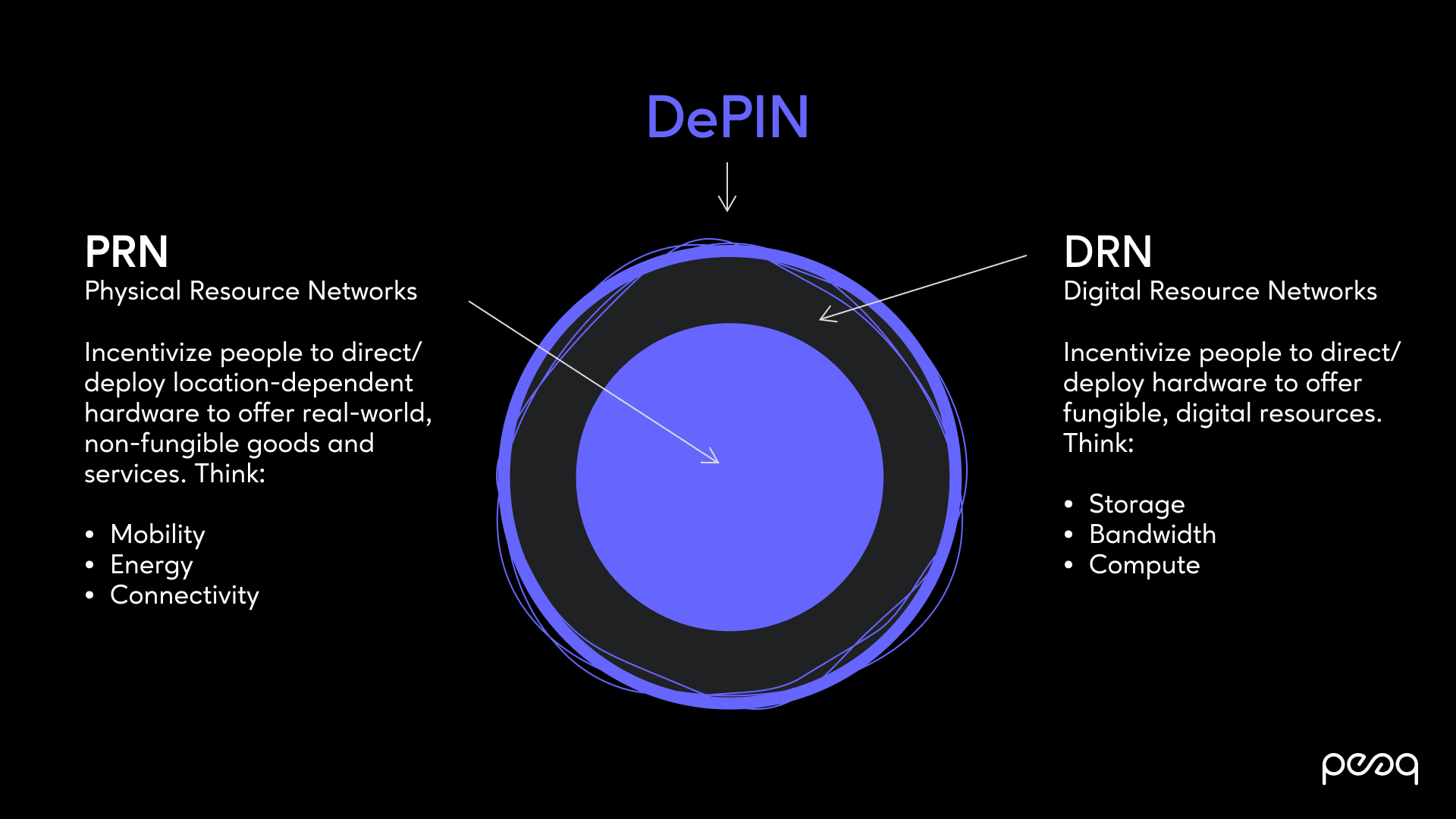
Source: Peaq X post
How does Phala Network fit into the DePIN narrative?
Phala Network seamlessly integrates into the DePIN narrative, playing a pivotal role in supporting the DePIN flywheel through its cutting-edge tech stack comprising of middleware, oracle, and general-purpose compute functionalities. As a key participant in the decentralized physical infrastructure network ecosystem, Phala Network contributes significantly to the overall dynamics of the DePIN framework.
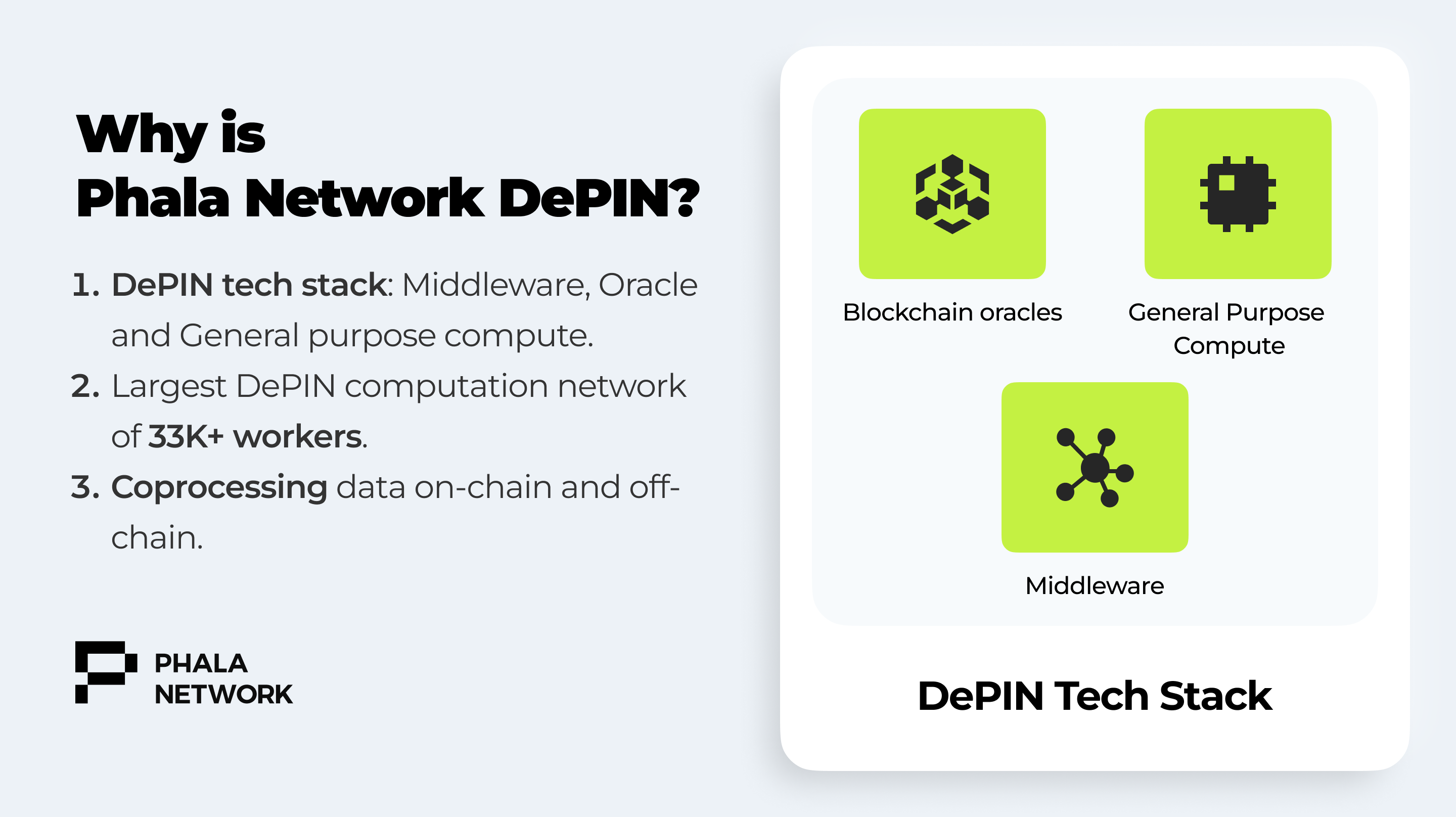
The DePIN Flywheel:
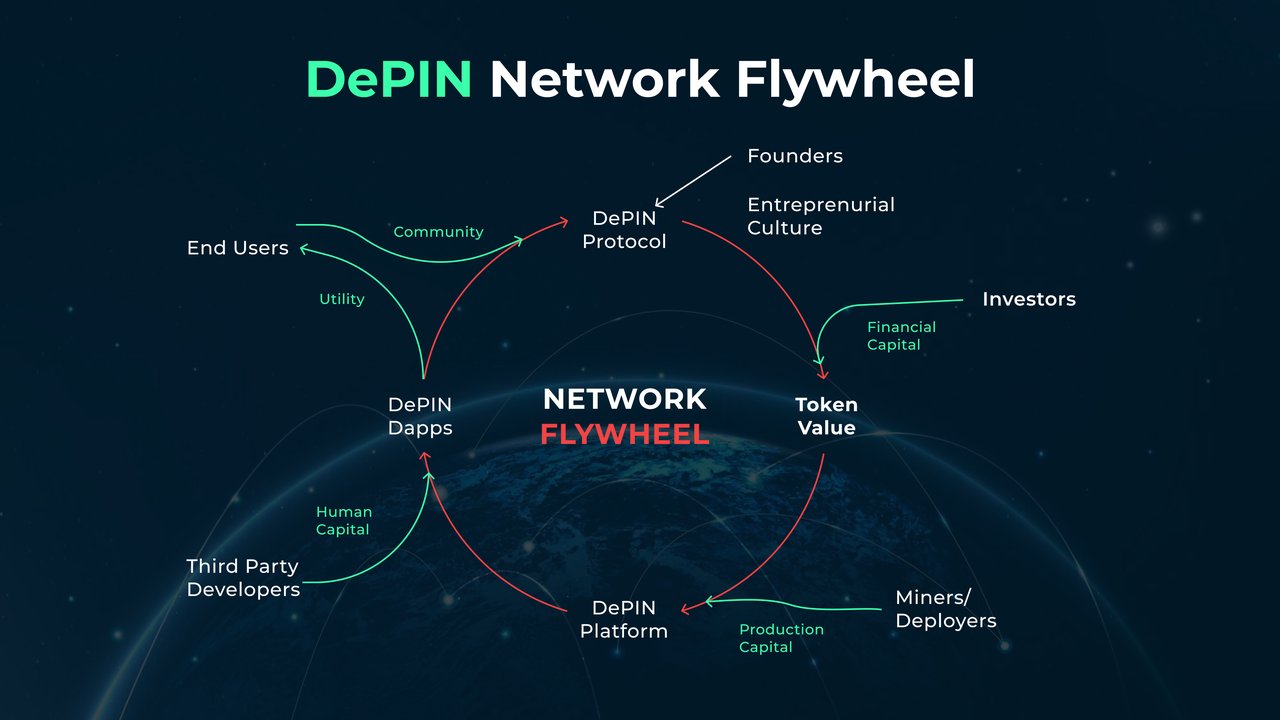
Source: Andrew Law X post
Middleware: Phala Network's middleware in form of Phat Contracts ensures efficient communication, enhancing network interoperability for seamless data flow between on-chain and off-chain components. This empowers developers to create supercharged dApps, democratizing access to advanced off-chain computation. In the realm of Web3 middleware, it facilitates:
- Building decentralized Oracles for on-chain price feeds, Twitter monitoring, and cross-chain data feeds.
- Providing a data attestation service for smart contracts.
- Offering a security-enhanced RPC node API.
- Serving as an indexer aggregator for projects like The Graph and SubQuery.
- Enabling workflow automation, keeper services, and IFTTT functionality.
- Providing personal storage and secret store features, such as personal transaction/address tagging on a blockchain explorer.

Oracle: Phala Network's oracles are pivotal in ensuring immediate data availability within DePIN. Powered by innovative technologies, the oracle-based attestation system facilitates accurate information exchange between decentralized applications and physical infrastructure. Oracles act as vital connectors, fetching, verifying, and transmitting external data to smart contracts.
They play a crucial role in bringing real-world relevance to smart contracts by enabling interactions with off-chain information. Understanding the roles of oracles enhances the potential of smart contracts, facilitating seamless interactions between the blockchain and external data.
No-code LensAPI Oracle explainer:
Visit ready-to-deploy Oracle templates for more information. Additionally, you can visit the developer documentation for more information on Oracle based use cases here.
General purpose compute coprocessor: Phala Network differentiates itself from other blockchains by offering general purpose compute coprocessor capabilities (wordy much). The role of Phala Network as a blockchain coprocessor is pivotal in addressing the scalability and computational limitations of current blockchain ecosystems:
- Data Access: By allowing more sophisticated data analysis and processing, Phala Network enables the development of more complex and useful decentralized applications.
- Offloading Computation: Phala Network acts as a specialized processor that takes on complex computational tasks from the main blockchain. This offloading significantly improves the efficiency and scalability of the network.
- Generating Verifiable Results: The results of such off-chain data access, process and compute should be verifiable by ZKP or TEE. And they can be used for smart contracts on any blockchain.
- Maintaining Security and Decentralization: Phala Network achieves this enhanced functionality while still upholding the principles of decentralization and security intrinsic to blockchain technology, often using advanced cryptographic methods like zero-knowledge proofs, MPC and TEEs.
An example of this can be visualized with Smart Contract extensions below
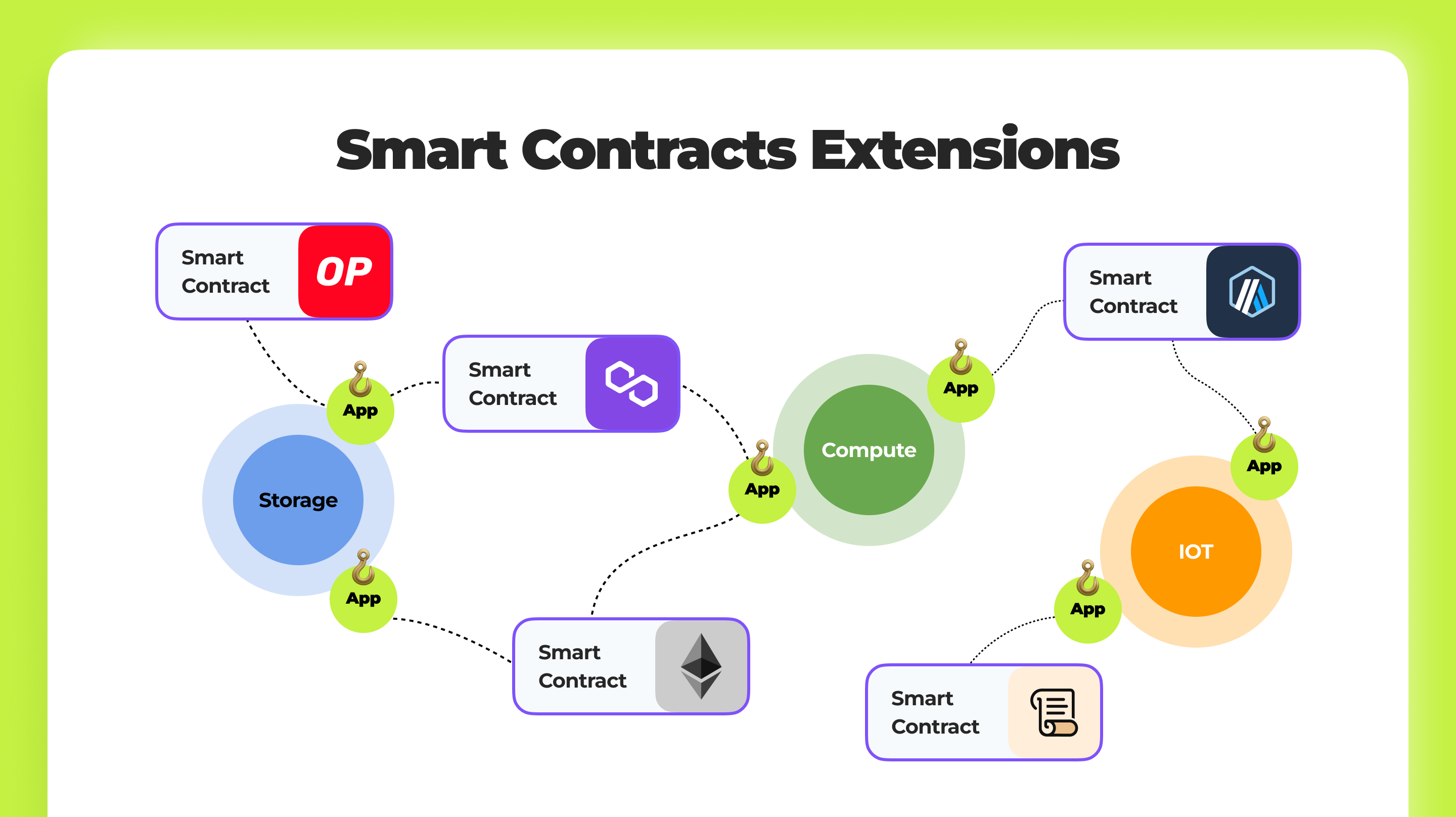
Smart contract extensions enhance interactions with decentralized infrastructures, revolutionizing the integration of compute, storage, and IoT services. Using Phat Contract, users can seamlessly integrate smart contracts with various DePIN projects. This integration enables on-chain developers to access and incorporate DePIN resources, accelerating dApp development. As a general compute coprocessor, Phala Network supports individual DePIN markets and bolsters smart contract capabilities.
Start building your web3 project with Phat Contracts: https://bit.ly/build_with_PC
Phala Network's Unique Approach to Security and Privacy: Harnessing TEEs and ZK Proofs

In the realm of security and privacy, Phala Network stands out by employing a powerful combination of Trusted Execution Environments (TEEs) like Intel SGX and Zero-Knowledge (ZK) proofs. Unlike other smart contract providers, Phala Network takes a comprehensive approach to safeguarding user data, ensuring protection from threats and vulnerabilities.
- Trusted Execution Environments (TEE): TEEs, such as Intel SGX, provide a secure and isolated environment within a computer's hardware. They can encrypt and protect sensitive data and code, even from the computer's operating system. In context of Phala Network, we use SGX to safeguard your private information when you use blockchain applications, ensuring that your data remains confidential and secure.
- Zero Knowledge Proofs (ZKP): ZK proofs, short for Zero-Knowledge proofs, are a mathematical way to prove that you know something without revealing the actual information. In the context of Phala Network, ZK proofs are used to verify transactions and computations on the blockchain without disclosing the specifics of those transactions. This adds an extra layer of privacy to your activities on the blockchain.
Phala combines the power of TEE SGX with ZK proofs to create a highly secure and private environment for blockchain usage. This means that when you interact with blockchain apps through Phala Network, your data is protected, and your activities remain confidential, offering you a safer and more private experience in the world of blockchain technology.
Argument for DePIN as a Coprocessor
In the realm of modern dApps aiming for widespread adoption, the key lies in utilizing a coprocessor. This is crucial because achieving mass adoption necessitates both more capable smart contracts and a vastly improved user experience (UX). The coprocessor serves as the fundamental solution to address these challenges. It acts as the primitive to offload complex tasks from smart contracts, enabling enhancements like smart wallets with Account Abstraction (AA), intent-centric approaches, and AI—previously deemed impossible.
With the largest DePIN infrastructure already in place with a network of over 33K+ workers/miners, Phala is poised to become the go-to coprocessor for modern dApps. The strategy involves pioneering innovations in modern dApps, onboarding developers to build on the platform, and continually enhancing the network for increased power and security. This compelling argument solidifies the notion that "DePIN is just Coprocessor.”
Conclusion
Phala Network is a key player in the DePIN ecosystem, specializing in Digital Resource Networks (DRNs). Contributing middleware, oracle, and general-purpose compute functionalities, Phala supports the DePIN Flywheel's sustainable decentralized physical infrastructure. Through efficient communication, enhanced interoperability, and addressing data availability challenges, Phala seamlessly integrates into the DePIN narrative. The middleware empowers developers to create innovative dApps, while Phala's oracles ensure immediate data availability. As a Coprocessor, Phala tackles challenges in achieving mass adoption by offloading complex tasks from smart contracts, making it a go-to solution for modern dApps.
What’s Next?
In our upcoming article, we'll unveil the plug-and-play DePIN SDK, empowering developers to unlock the full potential of their dApps with ease. Stay tuned!